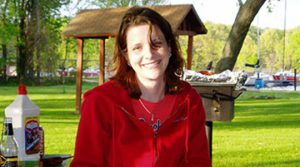By Shari Kiple
May 29, 2013
When Heidi Imker ’03 graduated from Winona State University, she might never have dreamed she would become the executive director of the Enzyme Function Initiative (EFI), a $33 million grant-funded collaborative effort sponsored by the National Institute of General Medical Sciences. Yet within just a decade of leaving Winona State, that’s exactly where her curiosity has taken her.
Hosted by the University of Illinois at Urbana-Champaign, the EFI coordinates the efforts of about 100 researchers at 14 different academic labs nationwide. In simplest terms, its goal is to characterize the function of enzymes, which are complex proteins that catalyze the chemical reactions necessary for life. It’s an incredible project with immense implications.
“The impact is real and laudable, but it is very downstream,” Imker says. “For me and most of my colleagues, facilitating discovery is our focus and our motivation. There are literally millions of proteins just waiting to be understood, so we’re driven by the great need for strategies and tools to discover important biology quickly.”
That drive to discover new things was what prompted Imker’s interest in undergraduate research at Winona State.
“I was proactive about talking with my professors about research possibilities,” notes Imker. All I had to do was ask, and they were more than happy to help me get into research.”
“It was always her curiosity that drove her,” says Robin Richardson, professor of biology and Imker’s advisor for her first research project, studying the nest-building behaviors of male beta fish.
“It didn’t bother me that I had to come in on the weekends or during breaks to take measurements and feed the fish,” Imker explains. “I had a natural dedication to the project; I was trying to answer a question.”
Studying fish behavior was just the beginning for Imker. The project sparked her curiosity, and Winona State professors shared connections to fully ignite her passion for research.
Richardson connected her with a research opportunity at the Upper Midwest Environmental Sciences Center, a program managed by the U.S. Geological Survey in La Crosse, Wisconsin. “Most people would probably have loved all the outdoor field work, but I loved the lab more,” Imker admits.
“I just felt more comfortable there.” She ended up back in the lab through a contact from Bruce Svingen, professor of chemistry, who connected her with a University of Notre Dame professor who was doing hardcore chemical synthesis.
“I think everyone should do research. It equips you to be able to troubleshoot later in life, and it teaches you to approach things in methodical, logical fashion,” shares Imker. “The critical thinking skills you gain from research cannot be underestimated.”
As her advisor and mentor, Richardson knew Imker’s drive and determination would serve her well in future study. “She’s going to be someone who’s always learning, someone who always wants to explore new things. That’s exactly the kind of person who needs to go to grad school.”
Inspired by Svingen during a lecture on protein structure, along with the news during her senior year that the human genome had been sequenced, Imker knew what she wanted to study in graduate school – but where?
She opted for the biochemistry program at the University of Illinois, where she completed her PhD in just five years. It was a big step, but one for which she felt well prepared.
“I knew how to study, and I knew how to think critically,” says Imker, “but the biggest edge for me was the research experience. I left Winona State feeling really good about what I was going on to do and that was incredibly important, because it can be competitive in grad school.”
Going on to do her post-doctoral work at Harvard Medical School, she admits, was a “major accomplishment,” but also rather intimidating. Once again she drew upon what she had learned at Winona State. “I dug into the confidence I had from earlier situations and did what worked in the past. Knowing I was well prepared, I tackled things in an organized and systematic way.”
Her approach garnered success, not only at Harvard but also back at the University of Illinois. About halfway through her post-doctoral work at Harvard, her former UI advisor called to tell her about the Enzyme Function Initiative, asking her to serve as the program’s executive director.
“No matter what I do next, this has been a good experience. I’ve had the chance to study something deeply and intensely, and I love what I’ve learned. I’m grateful for the things I’ve gotten to do,” shares Imker. “I wouldn’t have chosen any other way to go.”


